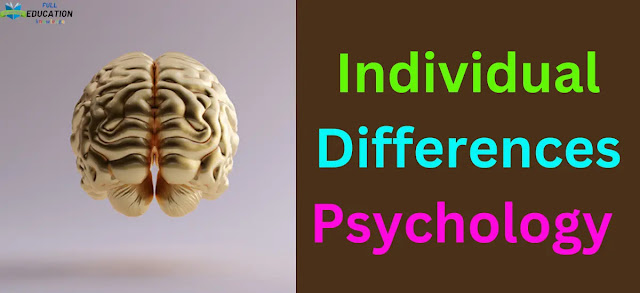Introduction:
Human beings are unique individuals with varying traits, abilities, and behaviors.. These particular variations in how people work greatly influence our lives, relationships, and general well-being. While a certain individual could be extraordinary in specific fields, others would struggle, illustrating the variety of human skills. It is essential to recognise and appreciate these distinctions if we are to promote inclusion, personal development, and a peaceful community. It discusses the various aspects of individual differences in human functioning as well as their implications.
Cognitive Abilities:
Cognitive talents are one area where individual variances exist. These processes are like problem-solving, memory , attention, and reasoning all come under the type of cognitive functioning. Some people are very cognitively gifted, displaying high IQs and sophisticated reasoning. Academically and professionally, these people frequently achieve success. On the other side, some people could have a hard time with cognitive activities, having trouble with learning, focus, or information processing. These changes are a conclusion of a genetic makeup, environmental influences, and personal experiences.
Personality Traits:
Personality qualities are another component of individual variations. A person's distinct combination of traits, viewpoints, and actions are referred to as their personality. Extraversion, suitability, scruples,emotional stability, and openness to experience are among the notable Huge Five character characteristics. The degree to which each individual possesses these qualities varies, which results in various behavioural patterns and interpersonal dynamics. For instance, extraverted people are frequently forceful, friendly, and outgoing, whereas introverted people are usually more reserved and contemplative.
Emotional Intelligence:
Another aspect of individual variations is emotional intelligence. An "emotional regulation" implies to the capacity to recognise, believe, and command one's own emotions as well as those of others.Some individuals are emotionally intelligent, which helps them to successfully control their emotions, empathise with others, and deal with social circumstances. These people frequently thrive in roles that call for emotional sensitivity, such leadership, counselling, or negotiating, and they frequently have good interpersonal abilities. Conversely, persons with lower emotional intelligence may struggle to manage their emotions, handle conflict, and develop strong relationships with others.
Learning Styles:
People have different preferences for learning. People learn new knowledge in a variety of ways and with different preferences. While some people might do well in a visual learning setting, others could favour aural or kinesthetic learning styles. While auditory learners gain from listening to lectures or participating in conversations, visual learners absorb topics more effectively when using visual aids like diagrams or charts. On the other hand, kinesthetic learners learn better via practical applications and tactile experiences. Recognising and embracing these variations may enhance each learner's experience, fostering efficient information acquisition and retention.
Implications and Importance:
Understanding how individuals vary from each other as far as their activities is significant for various reasons. It promotes diversity awareness and inclusiveness, to start. We may build an atmosphere that honours and accepts each person's unique qualities by recognising and respecting their strengths and flaws. This promotes a sense of acceptance and belonging, which improves wellbeing and productivity.
In addition, taking into account each person's traits enables modification of learning and working environments to enhance performance. Teachers can create instructional techniques that address the unique requirements of pupils by taking into account the variety of learning styles. Employers may also take use of employee preferences and strengths to cultivate a positive work ing environment. This tailored strategy improves performance in all areas, including learning outcomes and work satisfaction.
Additionally, recognising individual uniqueness promotes efficient teamwork and collaboration. Together, people with different talents, viewpoints, and working styles may harness the potential of collective intelligence. Organisations may encourage innovation, problem-solving, and creativity by utilising the individual capabilities of each team member. A society that values variance in human functioning will be more cohesive and productive.
Conclusion:
In conclusion, individual variations in how people behave span a variety of facets, such as cognitive prowess, personality traits, emotional intelligence, and learning preferences. These variations contribute to each person's individuality and influence their relationships, successes, and general well-being.
A society that is inclusive and harmonious must value and respect individual diversity. We encourage a sense of belonging and inclusion, which fosters personal growth and fulfilment, through appreciating and accepting varied abilities. Additionally, improving learning results and job satisfaction requires adjusting educational and working settings to individual requirements.
Furthermore, taking into account individual distinctions paves the way for effective teamwork and collaboration. By embracing the abilities and viewpoints of many people, organisations may 100% realise the potential of collective intelligence, leading to creativity, solving issues, and invention.
As we move through an increasingly linked together and numerous world, it is an essential to know and cherish the distinctive variability in human functioning. By doing this, we foster a culture that recognises and acknowledges each person's distinctive qualities.
FAQ:
What are the individual differences in human?
Individual variations and distinctions in a person's psychological, physical, and behavioural traits are referred to as individual differences in humans. Such variations can be identified in all kinds of dimensions and involving but not denied to:
Cognitive Abilities
Personality Traits
Emotional Intelligence
Learning Styles
Interests and Talents
Motivation and Goal Orientation
Temperament
Communication and Social Skills
Physical Attributes
What do you mean by individual differences in Psychology?
Individual differences are the fairly stable traits of psychology that set one person apart from another and contribute to defining each person's uniqueness. The most significant types of individual variations are those in personality, IQ, and values.



0 Comments